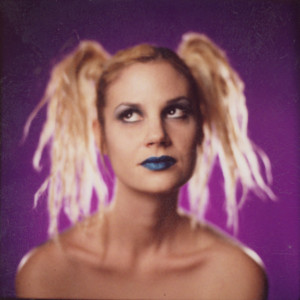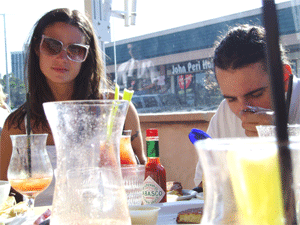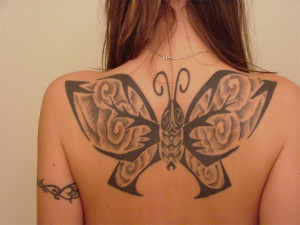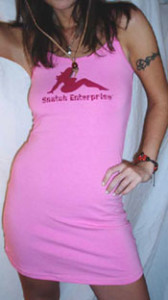Rose Martula is an interesting name. Is it your birth name or did you adopt it yourself? Were you named after someone?
My real name actually is Tanyss Rosemary Martula. Tanyss is my mother’s name, and it means Rose in Gaelic. So my name is really Rose Rosemary Martula, so I guess I truly am a Rose, no way of getting around it. I’ve always gone by Rose or Rosie, to make things less confusing with my mom having the same first name, and I don’t even answer if someone calls me Tanyss. Martula actually comes from a Sicilian bishop a long time ago so I’ve been told, though my background is half Polish and Russian, and then a real mutt-like mix of stuff.
Can you tell me about your background?
I grew up in the Northampton-Amherst of Massachusetts, which is a very liberal, progressive, hippie-esque area, with a huge art and independent music scene. My mom was an actress and a playwright so it was a fantastic experience to grow up around the arts. Soccer was also a big part of my life, and so my dad was great support in that area. I’ve been a bit of a nomad, though, since I was a teenager, and lived in New York City, Phoenix, Chicago, and now Los Angeles. I dropped out of high school, got my GED, started off in film school at the School of Visual Arts, finished up at Columbia College Chicago getting a B.F.A. in fiction writing, and then got an M.F.A. in playwriting at UCLA. My one regret in leaving school so young is that I stopped playing soccer competitively, but picking up skateboarding was a nice filler along the way.
Did your experiences at Columbia College help you in your careers? If so, how?
Yes, simply for the fact that it made me write. If it hadn’t been for the structure of having to go to class and having deadlines, my wild side might have gotten the best of me in Chicago. I took one playwriting class at Columbia, wrote a play, and that play won me a full ride to UCLA which was an incredible high.
How is the theater scene and or audiences in L.A. different from the theater scene and audiences in Chicago?
Chicago has a better sense of the word “community” when it comes to theater. Here, LA is so spread out, and it is such a car city that even though there is great art and culture out there, nobody goes. LA is also dominated by the film and TV industry, and that really puts theater in the background. I’ve also noticed that at least with the bigger regional theaters here, the theater tends to be much more conservative, straight, not willing to take as many risks.
How does writing for theater differ from writing short stories?
Writing fiction is a much slower process. You really have to take your time with it, and stop and spend a good amount of time in certain moments. Playwriting is less about description, and more about dialogue and character, so it’s kind of like using two different parts of your brain. The same goes with screenwriting, that’s another part of your brain as well. I think it’s easy to assume if you can do one, you can do the other, but each is so different. You have to see fiction, plays, and screenplays in totally different visual sets. Each form helps each other, too, keeps you on your writing toes, and I like switching back and forth between the three.
Were there any writers or performers that inspired you to go into theater?
I took a theater to trip to London when I was fourteen that changed my life. I saw about twenty plays in two weeks–everything ranging from David Mamet to Shakespeare to Beckett, and the absolute emotional rawness I felt as an audience member watching this plays and those actors (Derek Jacobi in particular stands out for me there) made me want to be that. I knew at that moment I should write plays. Sam Shepard has been a huge influence, as well as Harold Pinter, Eugene O’Neill, Tina Howe, Christopher Durang, Jose Rivera. Seeing Phillip Seymour Hoffman in A Long Day’s Journey Into Night was another uplifting experience as well.
Do you have a routine you follow when you write, and do you have to get yourself in a certain psychological state when you write?
I have no routine because as much as I’d like to control my writing inspirations, they come sporadically, almost in binges and purges. Like one moment, I’m a couch potato channel surfing, eating chips and gauche, and then boom, I’m up at the computer, blasting away on the keys, feeling more like a channel for the words than anything else. I don’t always feel like the words are necessarily coming from me, as hokey as that might sound. Any psychological state will do, sometimes I’ve written my best writing in the depths of depression, and oddly enough, when everything in my life seems right, sometimes I feel that it’s very hard to write.
Do you have any aspirations to write for television or film?
Yes, though I proceed with caution on that one. It’s a great way to make money, but writing big commercial stuff is not so much my thing. There are a lot of rules that drives me nuts in film. I find screenwriting the least satisfying of all the writing forms, and is definitely the most like work to me. Plus, the director is God in those situations, and I think that is the more creatively satisfying position ultimately. If I wrote for film, I’d want to direct, whereas in theater that’s not the case for me.
Do you have to get in a certain psychological state to model?
No, except when I wake up on a day, and am feeling like it’s an ugly day, an unsexy day, a fat day, whatever. But then I guess it becomes more about acting than modeling at that point.
How did your modeling career start?
I did a runway show for my aunt for Laura Ashley as a favor when I was a teenager, but it wasn’t until later in New York, when I was running around with some models, and started doing a shoot here, a shoot there, nothing crazy. I’m 5’7 and that’s a bit tough for the agencies to swallow, not matter how much I tried to Kate Moss it. My favorite was this one I did for this make up and hairline. At the time, I had these bleached blond dreads, and they pulled it into two pigtails, and gave me this whole ice-queen make-up thing. Now, I just do favors for friends, like modeling clothes for Randall on one of her sites.
Is your story “Father” partially or wholly autobiographical?
Nothing about it in the events is really autobiographical, but I suppose growing up I felt an extreme emotional isolation from my father. We missed each others lives somehow.
Is it possible to write fiction without in some sense writing about yourself?
It’s possible, and many writers do it, writing out of their own experience and they do it brilliantly, but I’ve never been able to. I write what I know. I figure these are the things that are needing to come out of my gut at the time.
How did you first get interested in theater?
First and foremost, my mother and all her crazy friends she brought home and crazy parties they all threw. One time I got to leave school early, because I was in one of my mother’s plays, and now that, THAT felt cool.
Is politics as important as talent in theater?
I think all writing is political, even when you’re not trying to address something political. Or maybe that’s not what you’re asking. Are you talking about the politics of what goes on in the theater? Sure, there’s a lot of politics, and stuff you have to swallow or give up, but theater is a collective, and it’s all about working with a group.
Can you discuss your collaboration with Randall Keys on “A Heavenly Blast?”
Randall filmed “A Heavenly Blast” in her lap because video cameras weren’t allowed in the theater, and then she edited it, and tried to put together different reels for the actors and for my web site.
Who are some of your favorite collaborators and why are they good to collaborate with?
My favorite collaborators are my peers, since they’re the ones I am and am going to be working with. Tom Burmester was a very talented director who did “A Heavenly Blast”, Leon Katz was a great mentor and dramaturge for me, and Sam Golzari, has been a muse of sorts in three of my plays, and he has endlessly thrown himself into my writing.
Can you give me details on your new play or any other new writings?
The play is called Salsa Saved the Girls, and a director at Warner Brothers is directing it here in Los Angeles in February. He’s hired a producer, and has cast a Tony-nominated actor so it’s exciting in the sense that it’s a professional production. I’m also working on a novel about heroin addiction, shopping around a screenplay called “The Red”, rewriting a play called “Ran Wild” which takes place in a bar bathroom, and have started a new play about the wall-street like office I work my day job in.
What other upcoming projects will you be working on in the future?
Other than my play, I’m just continuing to do mass mailings to contests and theaters. I have bites from Yale Rep and Manhattan Theater Club on one of my plays so that feels great.
Do you have any advice to give to budding playwrights, models or short story writers?
No, except finding voice.
What is the color of ice?
It’s an older play that I am going back to re-write that was done at UCLA. It won the Skirball McKennis Award, and is about a working-class Brooklyn family, dark comedy style.



